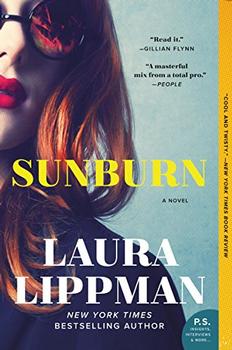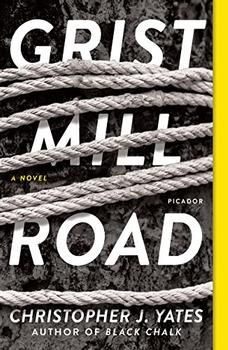Summary | Excerpt | Reviews | Beyond the book | Read-Alikes | Genres & Themes | Author Bio

Crime writer Laura Lippman is both prolific and versatile. After spending years as a reporter for the Baltimore Sun, she made her name as a novelist with the Tess Monaghan mystery series, about a reporter who becomes an "accidental" private investigator. In addition to this award-winning series, Lippman has also written a number of bestselling standalone novels, several of which blur the lines between literary and suspense fiction. Her latest work, Sunburn, incorporates many elements of noir fiction in a novel that will keep readers wondering about who among its many flawed but intriguing characters can be trusted (hint: it might be nobody).
Most of the chapters in Sunburn are told from the perspective of its two central characters: Polly (Pauline) and Adam. When we first meet Pauline, she's in the process of abandoning her husband and their young daughter while the family is vacationing on the Delaware shore. Intent on escaping without a trace, she accidentally winds up in tiny Belleville, Delaware, a town whose most notable feature is that tourists have to pass through it on their way to the more appealing beach resorts. On her first night there, at the town's lone nightspot, the High-Ho bar, she attracts the attention of Adam, another traveler who's wound up in Belleville for the night. Both Adam and Polly (as she's now calling herself) claim to just be passing through, but when days, and then weeks and months pass, their attraction to one another grows even as they secretly wonder what the other one is really doing in Belleville - and what they're hiding.
Adam and Polly's points of view are interspersed with chapters from other perspectives, including those of Polly's estranged husband and of a waitress at the High-Ho, where both Polly and Adam eventually get jobs. Readers are constantly shifting gears as they read, taking in new information and using it to piece together their own conclusions - all of which may be entirely wrong.
Readers are inclined to distrust Polly - the coldly calculating way in which she abandons her daughter, in particular, comes off as psychopathic, and "unnatural," as one character puts it - but Adam has his own secrets to hide. The novel is also a complicated (and sexy) love story that opens up multiple questions about whether it's possible to truly love someone if you can't trust them - and if you're deliberately holding back parts of yourself. Before all is said and done in this twisty, fast-moving thriller, Lippman has touched on domestic violence, arson, several kinds of insurance fraud, a mouthwatering recipe for grilled cheese sandwiches…and, of course, murder. Sunburn is deeply informed by classic noir novels and films, from the overall tone to specific plot points, but its setting in the 1990s make it feel like a perfectly blended mix of the old and the new. Noir offers a rich combination of dire circumstances and tortured characters, and Lippman has built on classic formulas, incorporating more contemporary storytelling techniques and creating in Polly a character who goes way beyond the femme fatale trope.
![]() This review was originally published in The BookBrowse Review in February 2018, and has been updated for the
August 2018 edition.
Click here to go to this issue.
This review was originally published in The BookBrowse Review in February 2018, and has been updated for the
August 2018 edition.
Click here to go to this issue.

If you liked Sunburn, try these:

by Christopher J. Yates
Published 2018
The highly anticipated new novel from the author whose debut was called "The smart summer thriller you've been waiting for...The novel you should be reading tonight" (NPR's All Things Considered) and was named a Book of the Year by NPR and an Entertainment Weekly Must-List Pick.

by Greer Hendricks, Sarah Pekkanen
Published 2018
A novel of suspense that explores the complexities of marriage and the dangerous truths we ignore in the name of love.
Your guide toexceptional books
BookBrowse seeks out and recommends the best in contemporary fiction and nonfiction—books that not only engage and entertain but also deepen our understanding of ourselves and the world around us.